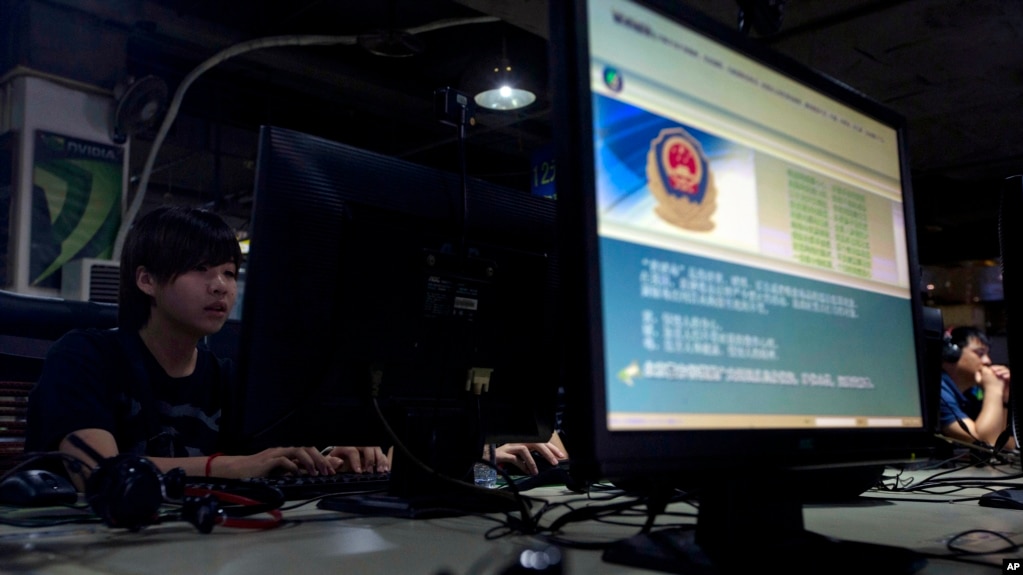Navigation
Install the app
How to install the app on iOS
Follow along with the video below to see how to install our site as a web app on your home screen.

Note: This feature currently requires accessing the site using the built-in Safari browser.
More options
You are using an out of date browser. It may not display this or other websites correctly.
You should upgrade or use an alternative browser.
You should upgrade or use an alternative browser.
Censorship And The Net
- Thread starter actsnoblemartin
- Start date
Uncle Ferd says dey need to clamp down on dey's state-sponsored hackers...

China to Crack Down on Virtual Private Networks
January 24, 2017 - Chinese Internet users may soon find it a lot harder to get around the notorious "Great Firewall" as the government has announced a crackdown on virtual private networks, or VPNs.
See also:
Analysts: China's New Internet Controls May Hurt China
January 25, 2017 - China has intensified efforts to tighten its strong grip on the internet, officially outlawing unauthorized internet connections, including virtual private network (VPN) services, which enable many users there to bypass the country’s infamous “Great Firewall.”
China to Crack Down on Virtual Private Networks
January 24, 2017 - Chinese Internet users may soon find it a lot harder to get around the notorious "Great Firewall" as the government has announced a crackdown on virtual private networks, or VPNs.
According to an announcement from China’s Ministry of Industry and Information Technology, VPN service providers will now have to obtain government approval. Using a non-approved VPN will no longer be allowed. The move is part of a 14-month campaign to "clean up" the service providers, according to the government.

Computer users sit near a monitor display with a message from the Chinese police on the proper use of the Internet at an Internet cafe in Beijing, China.
VPNs, which cost about $10 per month, have been used in China by some as a way to disguise Internet traffic to allow access to restricted websites like Facebook and Twitter, among others. The Great Firewall also filters access to certain topics the Chinese government finds objectionable, such as Tibet and the 1989 Tiananmen Square protests, which ended in violence. Criticism of the government is also filtered.
China began to police the internet in the mid-1990's and is constantly upgrading and changing how it censors certain content. The move to crack down on VPN use is just the latest attempt by the government to strengthen its hold on the internet in China. Last November, the government enacted a new law requiring internet service providers to collect personal information, CNN reported, adding that in 2015, Chinese state media called the blocking of VPN's a “healthy development.”
China to Crack Down on Virtual Private Networks
See also:
Analysts: China's New Internet Controls May Hurt China
January 25, 2017 - China has intensified efforts to tighten its strong grip on the internet, officially outlawing unauthorized internet connections, including virtual private network (VPN) services, which enable many users there to bypass the country’s infamous “Great Firewall.”
The Ministry of Industry and Information Technology (MIIT) announced in a notice Sunday that all special connections through internet data centers (IDCs), internet service providers (ISPs), content delivery networks (CDNs) and VPNs, operating from within China, are now required to secure prior government approval. Such operators will have until the end of March to commit in writing to abide by the new regulations and be tested to ensure full compliance before the year’s end. If they are found not to be in compliance, their unregulated operations will be shut down from next year on, the notice added.
Cross-border crimes
Li Yi, a Shanghai-based IT expert, told China’s official Global Times newspaper the new regulations are needed to strike at cross-border crimes and purify cyberspace. “Some multinational companies in China such as Microsoft Corp. have a reasonable need to communicate with their headquarters overseas via VPNs, but some corporations or individuals browse overseas Internet pages out of illegal motivations. In this regard, the new rules are extremely important,” he said. Analysts found China’s latest crackdown unsurprising in a country that has imposed some of the strictest internet censorship measures in the world for years. But it is alarming that the control has increased so greatly in the runup to the National People’s Congress in March and the 19th Communist Party Congress in fall, when its top leadership is reshuffled, they said.
Giant Chinese intranet
Charlie Smith, co-founder of Greatfire.org and FreeWeibo.com, said the move helps “push China closer to its vision of internet sovereignty, or a giant Chinese intranet.” But it will also inflict collateral damage, including isolating itself from the global internet. “The higher authorities are trying to make the large telecom companies responsible for information control via their platforms, with a list of specific things to watch out for. But this is easier said than done,” Smith said in a written reply to VOA.

China's President Xi Jinping is shown on a screen in front of logos of China's leading internet companies during the World Internet Conference in Wuzhen town of Jiaxing, Zhejiang province, China
He called enforcement into question as few companies wish to tend to “the nitty gritty details of how their services are being used by customers.” “They [telecom companies] will continue to make sure that paperwork is in place, but they will not spend too much time really getting into the details. This is also a huge cost for these companies. They simply cannot afford to conduct checks on every customer,” he said, adding that it will be a step too far for China to cut off access to the global internet with a greater self-imposed threat than free access to information. Smith’s website estimates that China blocked access to 172 of the world’s top 1,000 websites, including Google, Facebook, Twitter and YouTube.
Users will find ways out
owebo
Gold Member
Obama did untold damage transferring control of AGAI (algores amazing Internet) outside of America.....hopefully we can undo the damage.....
Russian, Chinese internet censorship to crack down on radical extremism...

Russian Parliament Bans Use of Proxy Internet Services, VPNs
July 21, 2017 - Russia's parliament passed a bill to outlaw the use of virtual private networks, or VPNs, and other Internet proxy services, citing concerns about the spread of extremist materials.
See also:
Amid VPN Crackdown, China Eyes Upgrades to Great Firewall
July 20, 2017 — A Chinese telecoms carrier said it had begun closing virtual private networks (VPNs) and other tools that can bypass the so-called Great Firewall, which state authorities use to filter and block traffic between Chinese and overseas servers.

Russian Parliament Bans Use of Proxy Internet Services, VPNs
July 21, 2017 - Russia's parliament passed a bill to outlaw the use of virtual private networks, or VPNs, and other Internet proxy services, citing concerns about the spread of extremist materials.
The State Duma on Friday unanimously passed a bill that would oblige Internet providers to block websites that offer VPN services. Many Russians use VPNs to access blocked content by routing connections through servers outside the country.

A customer uses a computer at an Internet cafe in downtown Moscow
The lawmakers behind the bill argued that the move could help to enforce Russia's ban on disseminating extremist content online. The bill has to be approved at the upper chamber of parliament and signed by the president before it comes into effect.
Russian authorities have been cracking down on Internet freedoms in recent years. Among other things they want Internet companies to store privacy data on Russian servers.
Russian Parliament Bans Use of Proxy Internet Services, VPNs
See also:
Amid VPN Crackdown, China Eyes Upgrades to Great Firewall
July 20, 2017 — A Chinese telecoms carrier said it had begun closing virtual private networks (VPNs) and other tools that can bypass the so-called Great Firewall, which state authorities use to filter and block traffic between Chinese and overseas servers.
A spokesman for Guangzhou Huoyun Information Technology Ltd, which operates in around 20 cities across China, told Reuters the company received a directive from authorities to start blocking services from midday on Tuesday. Enlisting telecom firms will extend China's control of its cyberspace - which it believes should mimic real-world border controls and be subject to the same laws as sovereign states.
While the Great Firewall blocks access to overseas sites, much like a border control, the telecoms firms can filter and censor online access at a more granular level, in the home and on smartphones. "The telcos have methods at their disposal that the Great Firewall may not," said Philip Molter, Chief Technology Officer at Golden Frog, which operates VyprVPN, a popular VPN in China. "Because these routers deal with far less traffic, they can block more aggressively using more resource intensive methods."

Computer users sit near a monitor display with a message from the Chinese government on the proper use of the Internet at an Internet cafe in Beijing, China
The telecoms firms have taken up their new filtering roles under a law introduced in January, and set to come into full effect next March. Experts say this could lead to increasingly targeted attacks on VPNs, one of the few tools Chinese can use to access overseas internet services. A member of China-based anti-censorship site GreatFire.org, who goes by the pseudonym of Charlie Smith, said the authorities were shifting the responsibility to the telecoms firms. "This is a major step towards closing whatever windows are still left open," he said.
New attacks
The latest moves come after dozens of popular China-based VPNs have been shut down in recent weeks, and there have been rolling attacks on overseas VPNs. This week, users also reported partial blocks and delays in the encrypted messaging app WhatsApp, the latest western social media tool to be hit. And researchers found that messages related to Liu Xiaobo, a dissident and Nobel laureate who died from cancer in custody last week, disappeared from local messaging apps. VPN services say they are bracing for further blocks in the run-up to this autumn's Communist Party Congress. President Xi Jinping, who has overseen a marked sharpening of China's cyberspace controls, including tough new data surveillance and censorship rules, is expected to consolidate his hold on power at the Congress, which takes place every five years.
The January regulations make telecoms providers and other internet service providers (ISPs) liable for filtering and blocking unlawful network tools, according to the Ministry of Information Industry and Technology (MIIT). Beyond VPNs, experts say the telecoms firms could potentially bar a range of services, and even prevent mobile apps from being installed. "Much of the usage we see from China is via mobile devices, so limitations on this kind of functionality would hit a large number of Chinese," said Golden Frog's Molter. Yet, despite the ambitious plans, the authorities will likely struggle to put up the blanket safeguards necessary to cripple foreign VPNs by March, experts say. "There's been an ongoing game of cat-and-mouse with China and VPNs ... we're optimistic that VPNs will continue to be accessible from China for the foreseeable future," said a spokesman for ExpressVPN, noting its user numbers continue to grow in China.
Small businesses
Similar threads
- Replies
- 5
- Views
- 160
- Replies
- 139
- Views
- 2K
Latest Discussions
- Replies
- 152
- Views
- 409
- Replies
- 122
- Views
- 2K
Forum List
-
-
-
-
-
Political Satire 8032
-
-
-
-
-
-
-
-
-
-
-
-
-
-
-
-
-
-
-
ObamaCare 781
-
-
-
-
-
-
-
-
-
-
-
Member Usernotes 468
-
-
-
-
-
-
-
-
-
-
